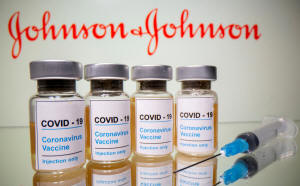U.S. ends J&J COVID-19 vaccine pause; shots to resume immediately
 Send a link to a friend
Send a link to a friend
 [April 24, 2021]
By Julie Steenhuysen and Manas Mishra [April 24, 2021]
By Julie Steenhuysen and Manas Mishra
(Reuters) -The United States can
immediately resume use of Johnson & Johnson's COVID-19 vaccine, top
health regulators said on Friday, ending a 10-day pause to investigate
its link to extremely rare but potentially deadly blood clots.
The Centers for Disease Control and Prevention (CDC) and Food and Drug
Administration said the risks of experiencing the syndrome involving
severe blood clots and low platelets as a result of the vaccine was very
low. They found 15 cases in the 8 million shots given.
"We are no longer recommending a pause in the use of this vaccine," CDC
Director Rochelle Walensky told a news briefing. "Based on the in-depth
analysis, there is likely an association but the risk is very low."
Top U.S. FDA officials said the decision was effective immediately,
clearing the way for shots in arms as early as Saturday. The agency said
it would warn of the risk in an updated fact sheet given to vaccine
recipients and providers.

The agencies made the decision following a meeting of outside advisers
to the CDC who recommended that the vaccine pause be ended.
In an analysis presented at the meeting, CDC staff said that the cases
of the syndrome that they had found occurred at a rate of seven per one
million doses in women under age 50, with the highest risk occurring
among women ages 30 to 39.
For women over age 50 and for all men, the clots appeared at a rate of
one per one million doses, the analysis showed. In all, there were three
deaths, officials said.
After a day-long meeting, the CDC panel voted 10-4 that the J&J vaccine
be used as recommended in people 18 years of age and older, the
parameters of its current FDA authorization.
Dr. Jesse Goodman, an infectious disease expert at Georgetown University
in Washington and a former chief scientist at the FDA, said the risk was
not trivial, but still small.
"But we should keep it in perspective. I mean the risk of dying from a
car accident in your life is something like one in 100, the risk of
being struck by lightning is something like one in 15,000," Goodman
said.
Unlike the highly effective vaccines by Pfizer Inc and Moderna Inc,
which require two doses and must be kept frozen at ultra-cold
temperatures, J&J's vaccine can be given in a single dose and stored at
regular refrigeration temperatures, making it a better option for
hard-to-reach areas.
Johnson & Johnson shares closed up 0.2% at $165.52.
EARLY IDENTIFICATION
"We will collaborate with health authorities around the world to educate
healthcare professionals and the public to ensure this very rare event
can be identified early and treated effectively," J&J's Chief Scientific
Officer Paul Stoffels said in a statement after the agencies made their
announcement.
[to top of second column]
|

Vials with a sticker reading, "COVID-19 / Coronavirus vaccine /
Injection only" and a medical syringe are seen in front of a
displayed Johnson & Johnson logo in this illustration taken October
31, 2020. REUTERS/Dado Ruvic/File Photo

When the agencies first announced the pause, they
urged doctors to avoid using the blood thinner heparin, commonly
given to patients to break up blood clots, in people who had
received the J&J vaccine and were experiencing blood clots and low
blood platelets.
In the cases of the vaccine-induced blood clots, however, heparin
appears to make the condition worse. Walensky said doctors heeded
that warning, noting that the drug had not been used in any of the
cases identified after the pause began.
The U.S. decision follows a similar one by the European Medicines
Agency, which on Tuesday said the benefits of the J&J shot
outweighed its risks and recommended adding a warning about unusual
blood clots with low blood platelet counts to the vaccine's product
label. J&J resumed its rollout there.
The J&J probe followed an investigation in Europe of the AstraZeneca
PLC vaccine, with which similar cases of blood clots were first
identified. Dr. Peter Marks of the FDA said the cases appear so
similar that a doctor would not be able to tell which vaccine caused
them.
Both the J&J and AstraZeneca vaccine use different versions of a
cold virus to deliver instructions for making coronavirus proteins
into cells to produce an immune response. Marks said studies are
underway to determine whether the adenovirus or something else is
behind the rare blood clots.
Dr. William Moss, executive director of the International Vaccine
Access Center at the Johns Hopkins Bloomberg School of Public
Health, said the J&J vaccine will help advance the vaccination
effort.

"Giving people the choice to receive a single-dose vaccine will help
get more people vaccinated faster and will better protect some
populations, such as those who are homeless or incarcerated," Moss
said by email.
J&J has faced several setbacks since its vaccine gained U.S.
emergency authorization in February, including drawing scrutiny over
production shortfalls.
In the United States, 35% of adults are fully vaccinated and 53%
have received at least one shot, according to CDC data. The United
States leads the world with roughly 570,000 COVID-19 deaths.
(Reporting by Manas Mishra in Bengaluru and Julie Steenhuysen in
Chicago; Additional reporting by Kanishka Singh and Derek Francis in
Bengaluru, Susan Heavey in Washington, and Carl O'Donnell in New
York; Editing by Will Dunham, Bill Berkrot and Caroline Humer)
[© 2021 Thomson Reuters. All rights
reserved.] Copyright 2021 Reuters. All rights reserved. This material may not be published,
broadcast, rewritten or redistributed.
Thompson Reuters is solely responsible for this content. |